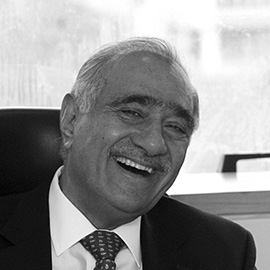Dear India, don't be like us please: a friend from Pakistan

The threat
- The rise of religious extremism poses a threat to the idea of India, writes Mahmud Durrani
- Pakistan has paid the price for religious radicalism. India must avoid going in the same direction
The responsibility
- Narendra Modi came to power on the promise of development
- He cannot turn a blind eye to the RSS\' divisive agenda
More in the story
- Can India go Pakistan\'s way?
- What should Modi do?
Secularism was a key component of Jawaharlal Nehru's vision for India. Nehru and Mahatma Gandhi before him realised the strains that a multi-religious and multi-cultural society would place on India and therefore placed secularism at par with democracy.
Unfortunately, the shortsighted policies of the current Indian government have begun to demolish this pillar of Indian nationhood.
There are two strong forces which are propelling this anti-secular agenda. First is the strong belief and commitment of the RSS, the ideological anchor of the BJP, to create a so-called pure Hindu nation.
The second force is the shortsighted agenda of the BJP to gain electoral advantage by playing the communal card.
Communal card helps no one
LK Advani was the first to play the communal card at the national level, through his Rath Yatra, which eventually led to the demolition of the Babri Masjid and communal riots across the country.
As we have learnt in Pakistan, playing the religious card to win popularity and votes is a dangerous strategy. Supporting the Hindutva agenda may appear to bolster the pride of the Hindu majority but I seriously doubt if it will launch India into the modern world. This I say as a friend of India.
Till recent years, India was admired around the world for its secular and democratic credentials. However, following a radical Hindu agenda will be no better than the radical Islamic agenda which has dominated Pakistan's political and social space in the recent past.
If Hindutva radicals continue to run riot, India will not need any external enemies
We in Pakistan are paying a very heavy price for the radicalisation of our society. India needs to learn from our mistakes and not follow us down this slippery slope.
Unlike Pakistan, India has a large minority. Over 14% of the total population of India is Muslim while other minorities like Christians, Sikhs, etc. form another 7%. Indian's Muslim population is more than the total population of Pakistan.
I have met a number of Indian Muslims who have settled in the US, Canada, England and South East Asia. They are staunch Muslims and firmly patriotic Indians a the same time.
Why does Narendra Modi want to play the Hindutva card and change the delicate balance between the Hindu majority and the minorities of India? In fact he should be working overtime to change the delicate balance into a more robust and positive Hindu-Muslim relationship. This will also help Modi in fulfilling his primary agenda of developing a robust economy and attracting foreign capital and technology.
Modi presents himself as a liberal, yet he turns a blind eye towards the RSS' communal agenda
With the Modi government's policy of promoting the Hindutva agenda, communal tensions are rising by the day, as is being reported in the media. If the current trend continues it will not be long before we see widespread Hindu-Muslim and possibly Hindu-Sikh riots across India.
It is possible that initially the RSS and its affiliates will get their way, but once Muslims are driven against a wall, they can also react strongly. This will not only destroy secular India but also strike a blow at democratic India.
Challenge for Modi
Modi presents himself as a liberal who stands for development, yet he is turning a blind eye to a well-orchestrated RSS plan to create communal divisions. For instance, the government is deliberately appointing Hindutva loyalists to educational and cultural institutions to rewrite history and promote Hindutva philosophy. This is a retrograde step.
The need to glorify a past that barely existed and suppress a glorious history of communal harmony possibly stems from the certain historical insecurities.
Today India is a stable democracy and a powerful nation on the way to becoming an influential world power. It would be unfortunate if historical insecurities push it in a regressive direction.
21% of India's population are religious minorities. They can't just be wished away
I am tempted to compare the Hindutva philosophy with the rise of Nazism under Hitler. Like Hitler's belief in the supremacy of the Aryan race, the RSS envisages a 100% Hindu nation. It also believes in an Akhand Bharat that spans the entire subcontinent.
It seems that the promoters of Hindutva have forgotten that the total population of Jews in Germany was less than 1%. The minority population in Pakistan is less than 3%, in India it is 21%. This very large minority cannot be wished away or converted to Hinduism. If the present trend continues in India, I foresee a lot of bloodshed, communal riots and terrorism as Hindutva promotes a fascist order, not democracy. With this agenda in motion, India does not need an external enemy.
The views expressed here are personal and do not necessarily reflect those of the organisation.
First published: 23 October 2015, 6:24 IST






![BJP's Kapil Mishra recreates Shankar Mahadevan’s ‘Breathless’ song to highlight Delhi pollution [WATCH] BJP's Kapil Mishra recreates Shankar Mahadevan’s ‘Breathless’ song to highlight Delhi pollution [WATCH]](https://images.catchnews.com/upload/2022/11/03/kapil-mishra_240884_300x172.png)

![Anupam Kher shares pictures of his toned body on 67th birthday [MUST SEE] Anupam Kher shares pictures of his toned body on 67th birthday [MUST SEE]](https://images.catchnews.com/upload/2022/03/07/Anupam_kher_231145_300x172.jpg)






